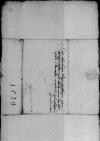List #4367
Ioannes DANTISCUS do Gdańsk Town CouncilHeilsberg (Lidzbark Warmiński), 153[8]-12-30
| odebrano Gdańsk (Danzig), 1539-01-05 Rękopiśmienne podstawy źródłowe:
| ||||||
Tekst + aparat krytyczny + komentarzZwykły tekstTekst + komentarzTekst + aparat krytyczny
ms 2 omitted⌈
Den ersamen, nhamhafftigen hern(n)
ms 2 omitted⌉
ms 2 Den von Danczk⌈ms 1 nothing written ,
ms 2 Den von Danczk⌉
ms 1 Unsern freuntlichen grus und alles guten zuvoran. / Ersame, nhamhafftige hern, / gunstige freunde. /,
ms 2 Unsern(n) etc.
⌈Unsern freuntlichen grus und alles guten zuvoran. / Ersame, nhamhafftige hern, / gunstige freunde. /ms 1 Unsern freuntlichen grus und alles guten zuvoran. / Ersame, nhamhafftige hern, / gunstige freunde. /,
ms 2 Unsern(n) etc.
⌉
Wir ms 1 haben,
ms 2 haben(n)⌈habenms 1 haben,
ms 2 haben(n)⌉ gestrigs ms 1 thags,
ms 2 tags⌈thagsms 1 thags,
ms 2 tags⌉ spath E(wer) E(rbarkei)t cf.
ms 2 schreiben(n)⌈schreybenms 1 schreyben,
ms 2 schreiben(n)⌉cf.
ms 2 die⌈dyms 1 dy,
ms 2 die⌉ ms 1 zceyse,
ms 2 zceise⌈zceysems 1 zceyse,
ms 2 zceise⌉ belangend / ms 1 empfangen(n),
ms 2 entfang(en)⌈empfangen(n)ms 1 empfangen(n),
ms 2 entfang(en)⌉, / ms 1 darauss,
ms 2 dar aus⌈daraussms 1 darauss,
ms 2 dar aus⌉ E(wer) E(rbarkei)t meynung wol ms 1 eingenhomen,
ms 2 eingenomen(n)⌈eingenhomenms 1 eingenhomen,
ms 2 eingenomen(n)⌉. / ms 1 Dyweyl,
ms 2 Dieweil⌈Dyweylms 1 Dyweyl,
ms 2 Dieweil⌉ aber
ms 2 her(r), iren(n)vorigen(n)willen(n)⌈her, yren vorigen wyllen /ms 1 her, yren vorigen wyllen /,
ms 2 her(r), iren(n)vorigen(n)willen(n)⌉ gewandelt / und ms 1 geboten,
ms 2 gebotn(n)⌈gebotenms 1 geboten,
ms 2 gebotn(n)⌉ das ms 1 geldt,
ms 2 gelt⌈geldtms 1 geldt,
ms 2 gelt⌉ der ms 1 zceisen zcu Maryenburgabtzulegenn(n),
ms 2 zceysen zu Marienburg abzuleg(en)⌈zceisen zcu
ms 2 zceysen zu Marienburg abzuleg(en)⌉, / musse wirs so ms 1 lassen,
ms 2 lossen(n)⌈lassenms 1 lassen,
ms 2 lossen(n)⌉ geschen und ms 1 volgen(n),
ms 2 folgen(n)⌈volgen(n)ms 1 volgen(n),
ms 2 folgen(n)⌉. / So aber
ms 2 die h(e)rn land⌈dy hern landtms 1 dy hern landt,
ms 2 die h(e)rn land⌉ und ms 1 stett,
ms 2 stet⌈stettms 1 stett,
ms 2 stet⌉
ms 2 erstn(n)⌈erstenms 1 ersten,
ms 2 erstn(n)⌉
ms 2 vorwillung⌈vorwyllungms 1 vorwyllung,
ms 2 vorwillung⌉ eintrechtiglich ms 1 wolten halthen / und dass einbrengen,
ms 2 woltn(n)haltn(n) / un(n)d das einbrengen(n)⌈wolten halthen / und dass einbrengenms 1 wolten halthen / und dass einbrengen,
ms 2 woltn(n)haltn(n) / un(n)d das einbrengen(n)⌉ solchs ms 1 geldes,
ms 2 gelds⌈geldesms 1 geldes,
ms 2 gelds⌉ mit ko(nigliche)r m(ajeste)t zulass ms 1 byss,
ms 2 biss⌈byssms 1 byss,
ms 2 biss⌉ uff negste ms 1 thagfhart vorschiben,
ms 2 tagfart vorschiben(n)⌈thagfhart vorschibenms 1 thagfhart vorschiben,
ms 2 tagfart vorschiben(n)⌉, / wolde wir uns ms 1 darnach wyssen,
ms 2 darnoch wissen⌈darnach wyssenms 1 darnach wyssen,
ms 2 darnoch wissen⌉ zu ms 1 richten,
ms 2 richtn(n)⌈richtenms 1 richten,
ms 2 richtn(n)⌉, / welchs wir der ms 1 mass,
ms 2 moss⌈massms 1 mass,
ms 2 moss⌉ in der ms 1 kurtze,
ms 2 kurcze⌈kurtzems 1 kurtze,
ms 2 kurcze⌉, / so ms 1 hy,
ms 2 hie⌈hyms 1 hy,
ms 2 hie⌉ von ms 1 sych,
ms 2 sich⌈sychms 1 sych,
ms 2 sich⌉ nicht ms 1 vyl wyl lassen schreyben,
ms 2 vil wil lossen(n)schreibn(n)⌈vyl wyl lassen schreybenms 1 vyl wyl lassen schreyben,
ms 2 vil wil lossen(n)schreibn(n)⌉, / E(wer) E(rbarkei)t, ms 1 dy,
ms 2 die⌈dyms 1 dy,
ms 2 die⌉ wir ms 1 Goth,
ms 2 Gote⌈Gothms 1 Goth,
ms 2 Gote⌉ in ms 1 sein gnad befelhen,
ms 2 sein(n)gnad(en) befelen⌈sein gnad befelhenms 1 sein gnad befelhen,
ms 2 sein(n)gnad(en) befelen⌉, / ms 1 freuntlicher,
ms 2 fruntlicher⌈freuntlicherms 1 freuntlicher,
ms 2 fruntlicher⌉ weis uff ms 1 der selbten,
ms 2 derselbtn(n)⌈der selbtenms 1 der selbten,
ms 2 derselbtn(n)⌉ gutmeynig ms 1 schreybenn(n),
ms 2 schreibn(n)⌈schreybenn(n)ms 1 schreybenn(n),
ms 2 schreibn(n)⌉ / nicht ms 1 haben woldt,
ms 2 habn(n) wolt⌈haben woldtms 1 haben woldt,
ms 2 habn(n) wolt⌉ bergen(n). /
ms 1 Datum Heylsberg,,
ms 2 Dat(um) Heilsberg, den(n)⌈Datum
ms 2 Dat(um) Heilsberg, den(n)⌉ XXX ms 1 December(r),
ms 2 tag Dece(m)b(ris)⌈December(r)ms 1 December(r),
ms 2 tag Dece(m)b(ris)⌉ MDXXXIX(!)[1].
ms 1 Ioannes, von Gots gnadenn(n) byschoff zu Ermelandt.,
ms 2 omitted⌈
ms 2 omitted⌉
[1] Both fair copy and rough draft give the year 1539 according to the Nativity style; the letter is a reply to cf.


 1
1